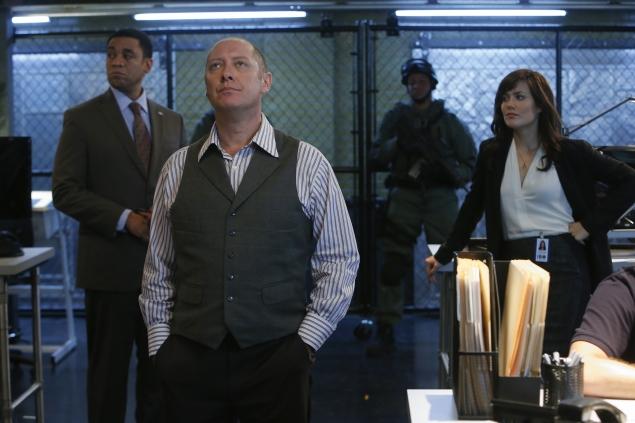Also Sprach Reddington
Kristopher Mecholsky / Louisiana State University

I said in my first piece for Flow that I would be exploring (in a very limited way) the rise of the influence of the meritocratic ideal on television. I noted that the lead figures of major television shows have tended in recent years to be brilliantly successful professionals: Don Draper (Mad Men), Walter White (Breaking Bad), Adrian Monk (Monk), Patrick Jane (The Mentalist), Patty Hewes (Damages), and so on. I briefly examined how this character developed in television history, indicating origins in the history of detective fiction through a combination of the private eye (e.g., Sherlock Holmes or Nero Wolfe) and the police procedural (e.g., Ed McBain’s 87th Precinct novels or Jack Webb’s Dragnet). Much more could be said in sketching out a history of meritocracy and its representations in American culture, but I also said I would continue looking at this ideal through the lens of two network shows (The Blacklist and The Office) in my two subsequent columns.
In this article, I want to look at The Blacklist and James Spader’s triumphant return to television. Many top bloggers and critics following the show have been disappointed or unexcited by nearly everything in The Blacklist. In their most generous estimations, they note that the show is meant to be “good, old-fashioned broadcast television” to give NBC “the breakout dramatic hit it so desperately needs” via a “deliciously absurd uber-story (20 years later, rogue spy turned freelance criminal comes in from the cold…) with the mother of all procedural shticks (and he’s going to bring all his friends and enemies with him).”1 Willa Paskin argued at Slate that the show is “pure pop,” allowing audiences their fix of villainy “guilt free.”2 In week-by-week assessments, however, many such glowing thoughts have tempered with time. Less charitable reviews—irritated with the absence of better character development for characters beyond Spader’s Reddington, as well as with its never-ending implausibility—have called the show “crazy in an unambitious way that smells of laziness.”3
The single thread connecting all positive reactions to the show is James Spader’s performance. And he is a pure delight to watch. Unlike some other major actors on television (like Kevin Bacon in The Following or Chevy Chase when he was on Community), Spader is dedicated in every episode to giving his character full life, channeling a Dionysian energy into thoughtful and memorable readings of his lines.
While I like Spader, I also think the show is doing something far more daring with the rest of its cast and plot. In this, I differ from many critics of the show. But as of the mid-season finale (the two-part “Anslo Garrick”) and the mid-season return (“The Good Samaritan Killer”), I think I have been justified. At least one other critic seems to agree with me: Jessica Voelker of The Washingtonian’s WashingTelevision blog notes in her review of Episode Three (“Wuijing”) that “as silly as it often seems, this is a sly show—just when you think it’s ham-fisting you with clunky themes and obvious tropes, the writers pull the rug out.”4
As I mentioned in my first column, The Blacklist offers a critique (at a slant) of the meritocratic ideal. On the surface, the show actually seems to replicate the meritocratic ideal displayed on so many other shows. The apparent premise of the show’s plots is a capable agency’s investigations into capturing some of the world’s worst criminals, lead by a charismatic and exceptional individual who possesses a wealth of knowledge the rest of the team cannot match, although they do demonstrate indispensability in each episode to stop the villain of the week. Summarized this way, the premise could easily be that of The Mentalist or Sherlock or—almost directly—Bones. One expects to see Spader’s Reddington suavely tell the task force what to do, while they competently carry it out, all accompanied by witty banter. Part of that is true. Reddington often seems to know what to do, but he is clearly working toward his own agenda. He will willfully lead the FBI team astray to complete his own goals, as he does in the second episode, “The Freelancer,” when he directs the FBI’s attention to a waiter to divert their attention while he kills the anti-sex-trafficking sex trafficker Floriana Campo. Moreover, even when he helps the agency directly, they often bungle the mission or handle it incompetently (at least, compared to other procedurals).

Government agency ineptitude stretches far and wide. In nearly every episode, the government has no real idea about the cases Reddington brings to them; he always escapes their surveillance when they are tracking him, and only allows himself to be caught again; they are woefully under-informed, and their attempts to gain information are usually superfluous or useless. In Episode Four (“The Stewmaker”), CIA agent Malik tortures a drug lord for information when there is ultimately no information to get from him. Perhaps most tellingly, the central FBI agent in the show (Elizabeth Keen) is not particularly good at her job. She consistently disobeys orders, talks back to authority, and violates basic ethical rules in her line of work.
Meanwhile, Reddington always accomplishes his own goals, and he does so splendidly with a crack, motley team of experts. Some of the show’s best humor lies in the ceaseless parade of Reddington’s competent, unexpected associates: the chemical weapons expert in the first episode who gratefully and deferentially runs away with a bomb (“That is a chemical weapon!” Keen yells. “He’s fascinated by the things,” Reddington responds) or the suburban mom who literally launders counterfeit money in her garage (“She’s an artist,” Reddington tells the incredulous Keen). They all seem so passionate and dedicated to their work, but they come from unanticipated sectors of society. This is a travesty of the kind of meritocracy many Americans expect their own society to mirror. In The Blacklist, those who are best at their jobs are not known for it publically. They are certainly not recognized by the authorities.
So how does Reddington fit into this structure? Because tortured anti-heroes have been at the center of many acclaimed series in recent years, some audiences of the show have read Spader’s character in a similar way. Willa Paskin argues that his working for the “good guys” allows the audience to revel in horrible actions without guilt. I disagree. I think the show intentionally tries to force the audience to confront the cruelty that law enforcement and authority often implement in the pursuit of order—for instance, through Malik’s readiness to torture. The audience is not supposed to identify with incompetent cruelty. Instead, the audience has the unflappable, self-confident Red. He is not a traditionally good, moral person, but he is likable and attractive because he is so consistent—a characteristic that is particularly attractive among so many duplicitous and contradictory people.
Ultimately, I think Reddington is a kind of Nietzchean, libertarian existentialist. His clearest characteristics are his infectious zest for living and his uncompromising code of ethics. In “Anslo Garrick” (parts one and two), the audience is finally treated to some very particular insights into Reddington’s worldview. When Reddington is pursuing extreme measures to save Agent Ressler’s life, Ressler wonders why Reddington would want to save him since Ressler has previously tried to kill Reddington. Reddington responds, “Because that’s what you do when someone’s dying in front of you.” He explains, echoing some lines of dialogue from the first episode, that interests shift constantly, and a person who saves a life one day may be trying to end it a week later. His response to the fickle nature of humankind is momentary situational ethics.
“Sometimes you just have to take what you can in this crazy world,” Garrick tells Reddington, reminding him that it was Reddington himself who taught Garrick that lesson. But it is Reddington’s words to Ressler earlier that truly mark Reddington’s profile. When Ressler suggests going out in a blaze of glory, dying for the Bureau, Reddington reminds him that there’s a reason no one sees what happens to Butch and Sundance at the end of their movie. A bloodbath “does not a sequel make.” He assures Ressler that if anything is true about him, “I’ll be around for the sequel.” He does not anchor himself to the dream of any other world other than this one: “Remain true to the earth,” as Zarathustra says in his prologue.5
I think it is very plain that The Blacklist seems to be presenting a libertarian dystopic fantasy in which a magnanimous, self-affirming existentialist moves his way through a corrupt, ineptly governed society. The fantasy has taken an even more dystopic turn with the revelation that some secret organization (represented by Alan Alda’s Mr. Fitch) wields significant power over Reddington.
Moreover, in “The Good Samaritan Killer,” the audience learns that Mr. Fitch is also a United States Senator. Impressively, however, and despite the show’s trappings of a Tea Party polemic, The Blacklist is not particularly political. In several episodes (e.g., “General Ludd” and “The Good Samaritan Killer”), distinctly left-wing ideas have been given positive spins, even as counter-arguments to them are presented. If the show’s non-partisanship is suspect in any way, simply remember that for a show with an exceptionally talented individual at its center, it also provides ample critique of the idea that American society is a meritocracy.
Image Credits:
1. James Spader as Reddington
2. Reddington and the FBI
Please feel free to comment.
- Mary McNamara, “Review: ‘Blacklist’ wows,” Los Angeles Times, September 23, 2013, http://www.latimes.com/entertainment/tv/showtracker/la-et-st-hostages-blacklist-20130923,0,2151163.story#axzz2qIPDnhtN. [↩]
- Willa Paskin, The Guilt-Free Antihero, Slate, November 3, 2013, http://www.slate.com/articles/arts/television/2013/11/james_spader_in_the_blacklist_reviewed.html. [↩]
- Phil Dyess-Nugent, “The Blacklist: ‘Wujing,’” TV Club, The A.V. Club, October 8, 2013, http://www.avclub.com/review/the-blacklist-wujing-103760. [↩]
- Jessica Voelker, WashingTelevision: The Blacklist, Season One, Episode Three, “Wuijing,” The Washingtonian, October 8, 2013, http://www.washingtonian.com/blogs/afterhours/washingtelevision/washingtelevision-the-blacklist-season-one-episode-three-wujing.php. [↩]
- Friedrich Nietzche, Thus Spake Zarathustra: A Book for All or None, translated by Thomas Common (New York: Macmillan, 1911), Project Gutenberg, http://www.gutenberg.org/files/1998/1998-h/1998-h.htm#link2H_4_0004. [↩]
“I think the show intentionally tries to force the audience to confront the cruelty that law enforcement and authority often implement in the pursuit of order—for instance, through Malik’s readiness to torture.”
I see this theme as a critical part of modern drama; we continue to see a variety of shows testing the rules and boundaries of what characters can do to achieve their ends. The question, “What is deemed permissible for law enforcement?” continues to be a crucial question for the viewer to ponder.
As a viewer who has never had an “inside view” of modern law enforcement, I am forced to construct my image from an amalgam of TV news and Hollywood drama. And I ask, “Where does the truth lie?”